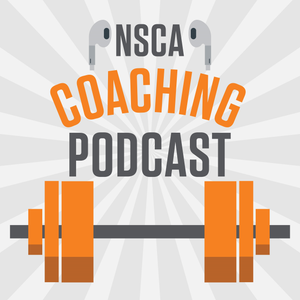
NSCA’s Coaching Podcast
NSCA
This is the NSCA’s Coaching Podcast, where strength and conditioning coaches share their experience, lessons learned, and advice about how to thrive in a highly competitive profession. Published by the National Strength and Conditioning Association, www.nsca.com.
- Jenny Rearick | Great Coaches are Professional Communicators
Do you fear public speaking? It may seem counterintuitive for coaches who command the weight room every day, but it’s more common than you’d think. On the floor with your athletes, you’re in your element, but shifting audiences to administrators can have you second-guessing. Honing your communication and public speaking skills shouldn’t be saved until you’re eyeing a promotion — Coaching & Presentation Skills Coach Jenny Rearick advises getting in as many early reps as possible. Combining her experience as a collegiate athlete, strength and conditioning coach, and corporate marketer, Jenny founded Fit to Speak to empower fitness professionals in the “sport” of public speaking. Discover concrete strategies like the BLUF method to make sure your key message is heard. Learn how to seek out low-risk scenarios that can transform your speaking skills from just getting by to getting ahead. Plus, don’t miss her simple mindset shift to ease pre-presentation nerves.
Connect with Jenny on Instagram at: @fit_to_speak or online at: fit-to-speak.com | Find Eric on Instagram: @ericmcmahoncscs or LinkedIn: @ericmcmahoncscs
Check out Jenny’s episodes in the new NSCA Presenter Playbook series on NSCA TV. Ready to take the big stage? Apply online to speak at a 2025 NSCA event before the May 15 deadline.
BONUS: Answer Bryan Mann’s “call to arms!” Get involved locally and give back to your strength and conditioning community at NSCA.com/Volunteer
Show Notes“Maybe a strength and conditioning coach is part of a recruiting visit for an athlete, and having to connect with a high school athlete, or their parents coming through the weight room. You're essentially having to sell that program in a different way than you would to your athletes on the day-to-day.” 9:35
“If people are going to see my body language and hear my voice in the way I'm delivering this information, that's going to impact how they perceive that information. Because if they perceive me as being grounded and competent and confident in what I'm saying, they're more likely to buy into the information I'm sharing.” 24:20
“Whenever I talk about nervousness or anxiety, I love this quote by Mark Twain. He said, "There are two types of speakers in this world, the ones that are nervous and the ones that are liars."” 28:15
“I think it can be really empowering to know – what's the most effective way to organize information so that it can be easily understood or acted on as an example. There is an acronym that they use in the military called BLUF, B-L-U-F. They follow it mostly in writing, but it applies to speaking as well. It stands for Bottom Line Up Front. Some of you might be familiar with it. Essentially, what it means is the very beginning of what you're writing or saying should be the bottom line. It should be, what is my main takeaway? What is the most important thing I need to say?” 31:45
26 April 2024, 4:00 am - Bryan Mann | From Athletics to Human Performance: Shaping the Future
Since 1998, Bryan Mann has dominated strength and conditioning, securing positions at elite collegiate programs and defining research in strength, power, and velocity-based training (VBT). As the Academic Director of Strength and Conditioning at Texas A&M University, Bryan still gets the rewarding chance to shape students like his former athletes, but now, he’s focused on the future. He’s expanding his scope to human performance as a whole — applying his coaching expertise to advance performance across general, special, and tactical populations. Join NSCA Coaching and Sport Science Program Manager Eric McMahon as we follow Bryan’s professional path, including his recent transition to the Aggie’s powerhouse performance staff alongside Bo Sandoval and Tommy Moffit. Plus, explore pioneering research on Parkinson’s, the rise of individualization in VBT, and how to create a “forward” (not backup) plan for career longevity.
Connect with Bryan on Instagram @jbryanmann or Twitter/X @jbryanmann | Find Eric on Instagram @ericmcmahoncscs or LinkedIn @ericmcmahoncscs
In this episode, you’ll learn about the NSCA Presenter Application process. Apply by May 15 to be considered for 2025 local events and conferences while earning CEUs for your expertise.
Show Notes“What kept me coaching on the floor for so long, even with having the PhD, was watching the athlete develop from a child to a mature adult. [...] That’s what I really enjoyed. And I just use the weight room and jumps and sprints and everything as a vehicle for that.” 2:43
“You can take plyometrics and scale that to the aging population. That's going to help to the tightened isomers. That's going to help with the stored elastic energy that they're not getting depth through the resistance training. You could do all the heavy stuff you want. You can do all the fast stuff you want. But if you are not using the stretch-shortening cycle appropriately, you're not going to be influencing gait. You're not going to be influencing mobility appropriately.” 14:10
“Find what excites you. What do you think about at night? What do you think about in the morning? What is it that’s always on your mind? That’s the area you should explore [...] because that is what’s going to make you great.” 17:20
“If you have the ability to apply your skillset in another area, you just increased your ability within the job market to go ahead and apply that towards aging, towards general population.” 23:06
“The best ability is availability. And if I have my athletes out on the field feeling good, they’re going to be playing better than if they maintain 95% of their squat max.” 34:46
12 April 2024, 4:00 am - Anna Craig - NSCA’s Coaching Podcast, Season 7 Episode 22
In this episode with Associate Head Coach of Athletic Performance, Anna Craig, you will learn how “Annual Strategic Planning” improves the professionalism and unity of the University of Texas (UT) Olympic Strength and Conditioning Department. Craig shares her coaching philosophy and talks about the role of mentors during her tenure at UT with NSCA Coaching and Sport Science Program Manager, Eric McMahon. This episode stresses the importance of building autonomy in student-athletes and having humility to effectively manage staff dynamics within collegiate strength and conditioning. Learn about how Craig’s off-campus work, coaching in the private sector, allows her to grow professionally. Tune in for some useful tips on staff and facility management.
Connect with Anna on Instagram at: @annaecraig or by email at: [email protected]| Find Eric on Instagram: @ericmcmahoncscs or LinkedIn: @ericmcmahoncscs
Show Notes“I want to encourage anyone who is a director of their team or anyone who is in charge of hiring or in charge of longevity—I want to emphasize just the importance of coaches being in their position for a period of time to really make an impact on the place that they are and to really make an impact on their programs and teams.” 5:47
“My philosophy, in life and in my coaching, is that I would like to—if you gave my athletes an exit interview or if you talked to somebody who knew me and you asked them, are you a better person and a better athlete having been coached by Anna than you would have been otherwise?” 11:23
“I want to intrinsically motivate my athletes to seek significant change within themselves and confidence within themselves to be someone at the end that they are proud of.” 12:32
“And part of that is just getting them comfortable with giving each other feedback too. Having hard conversations and giving feedback is uncomfortable. And if they can’t do it in an incredibly controlled situation within the weight room or within strength training, then they have no chance doing it in a heated situation on the field. They’re probably going to handle that incorrectly, not say anything. And so, I want to teach them how to be good communicators. I want to teach them how to be responsible.” 17:35
20 March 2024, 4:00 am - Kenna Smoak-Minnici - NSCA’s Coaching Podcast, Season 7 Episode 21
Get to know the 2024 NSCA Assistant College Strength and Conditioning Coach of the Year, Kenna Smoak-Minnici. After accepting her award at the 2024 Coaches Conference, she connects with NSCA Coaching and Sport Science Program Manager, Eric McMahon, about the unique coaching rigors at the prestigious military academy, Army West Point. The episode goes beyond the demands of sport-specific training to developing student-athletes and leaders for sustained success in the military. Smoak-Minnici highlights the role of family along her journey as an athlete and strength and conditioning coach, as well as the importance of always pushing yourself to go beyond the norm.
Connect with Kenna on Instagram at: @kenna_minnici or LinkedIn: @kenna-smoak-minnici | Find Eric on Instagram: @ericmcmahoncscs or LinkedIn: @ericmcmahoncscs
Did you enjoy the episode? Don’t forget to nominate a deserving strength and conditioning coach for an NSCA Coach of the Year Award at NSCA Awards.
Show Notes“I also help out with the Athlete Monitoring Program. Everyone is probably familiar with—to get in the military, you have to have meet certain height and weight requirements, or physical abilities that might lean more towards distance running, push-ups, sit ups, whatever it may be. But when you have a 300-lb lineman, or a heavyweight wrestler, or a rugby player, or a thrower, that type of training might not—that body size isn’t conducive to their athletic career for them to stay safe and be successful. So, I work close with getting those athletes ready to commission once their sports seasons end.” 4:48
“When I got to middle school, my parents sat me down and they’re like, okay, maybe softball, or track, or some of your other sports might—and I was like, “no, I’m playing football. I like this the best. I like hitting people.” So, then my dad was, to really appease my mom, like, “don’t worry, I’m going to make her quit.” And so, then he made me get up every morning at 5:00 AM and do his whatever he knew about two hours of working out before school in middle school and I fell in love with it to where he didn’t make me quit. So, I played through junior year.” 11:30
“To me, it’s just all flowing and I can’t compartmentalize it. I’ve been at West Point a while, so I really do feel like I have a family here, to where I can bring my son around. There’s definitely been last minute schedule changes. I’ve thrown him in the hiking backpack and just coached a group. My players love him and he loves Army. It means so much to me for him to see me feel like I have a purpose in my career.” 15:15
8 March 2024, 5:00 am - Justin Loudon - NSCA’s Coaching Podcast, Season 7 Episode 20
Have you ever considered getting a K-12 teaching license, with your CSCS, to gain employment as a high school strength and conditioning coach? Coach Justin Loudon serves as the Chair of the NSCA High School Coaches Professional Development Group (PDG). He shares PDG updates with NSCA Coaching and Sport Science Program Manager, Eric McMahon, including highlights from the 2024 NSCA Coaches Conference and direction for the future of high school coaching. Learn about the impact of school-based strength and conditioning beyond the weight room, and important benefits for students over their lifetime.
Connect with Justin on Instagram at: @coach_loudon or by email: [email protected]| Find Eric on Instagram: @ericmcmahoncscs or X (Twitter): @ericmcmahoncscs | Here is a link to engage with NSCA Professional Development Groups.
Show Notes
As mentioned in the episode, check out the book: NSCA's Guide to High School Strength and Conditioning“I think it's more about being a physically literate individual. So for me, being able to teach these kids and educate these kids on how to do this, I think it just sets them up for success later on in their life.” 6:38
“Our job is really to help mold those kids, the whole child aspect. It's not just focusing on sports. And if I can get that 93%, 94% stronger and better and more athletic, than the other 6%, 7% is going to come with it as well.” 12:48
“Being a coach is being a teacher and being a teacher is being a coach. And I think if you can get that education background, even a couple of classes on it, that's really going to help you out as a coach, whether it's in the college level, professional, or wherever, just being able to look at things maybe slightly different.” 25:10
23 February 2024, 5:00 am - Joey Greany - NSCA’s Coaching Podcast, Season 7 Episode 19
Catch up on this presentation from the 2024 NSCA Coaches Conference with Major League Baseball (MLB) Tampa Bay Rays Strength and Conditioning Coach, Joey Greany. Greany takes NSCA Coaching Program Manager, Eric McMahon, on a deep dive into plyometrics for a wide range of athletes. He also shares the importance of professional development for strength and conditioning coaches. Tune in to learn in-season training tips and how the NSCA inspired Greany’s path to the Big Leagues.
As mentioned in the episode, here is a link to learn more about the Professional Baseball Strength and Conditioning Coaches Society (PBSCCS).
Connect with Joey on Instagram at: @joeygreany | Find Eric on Instagram: @ericmcmahoncscs or X (Twitter): @ericmcmahoncscs
Show Notes“I was very interested in fitness, in sports training. So I went to school for exercise science, physical education. Upon graduation, I explained to the group that my academic advisor, at the time, printed out the NSCA, I guess, job board and the NSCA website, handed that to me. I was walking back to my dorm room, reading the material that he just printed out from the NSCA, and you know, I was completely hooked. I said, this is something that I want to do. Eventually, I want to work with the best athletes in the world.” 8:40
“The Professional Baseball Strength and Conditioning Society, is an organization that represents all the strength coaches in professional baseball. When it first started out, there was only a few coaches involved. Over the course of some years, we’ve grown to probably 300 plus coaches that are involved. That’s both Minor League coaches and Major League strength and conditioning coaches, as well as other directors and coordinators are also involved.” 12:45
“Communicating with the players on the team, developing relationships and trust with these players on your team is very important to get them to do the things necessary to improve performance.” 17:45
“It’s important that you manage strength and power levels, while also keeping in mind of fatigue and recovery throughout the whole off season. And there’s a number of different strategies, techniques, and methods to go and to utilize that. As far as sets and repetitions, I like giving a set and repetition range for my athletes.” 20:28
9 February 2024, 5:00 am - Catherine Wallace - NSCA’s Coaching Podcast, Season 7 Episode 18
From tactical strength and conditioning to developing the skills to train a specialized group of football kickers, Catherine Wallace shares how growing up in a military family inspired her into coaching. In this episode, Wallace connects with NSCA Coaching and Sport Science Program Manager, Eric McMahon, on how to pursue a tactical coaching career in different branches of the military and public safety. She discusses how earning the Tactical Strength and Conditioning Facilitator® (TSAC-F®) certification led her to pursue the Certified Strength and Conditioning Specialist® (CSCS®), and more ways that involvement with the NSCA has positioned her for career growth. There is also a discussion about “holistic programs” within strength and conditioning, an area that has been popularized, but is perhaps still misunderstood. Listen and learn about the rapidly growing tactical strength and conditioning area of the field, and the mindset needed to thrive as an impactful coach.
Connect with Catherine on Instagram at: @tac.coach.cath or by email: [email protected] | Find Eric on Instagram: @ericmcmahoncscs or Twitter: @ericmcmahoncscs
Show Notes“I would say, a big piece of advice if you are making that transition is take time to be a fly on the wall and observe and soak in the community and the area that you’re working within. That’s going to be helpful to build trust within your tactical athletes that are coming through.” 7:29
“The NSCA provides so much great content, opportunities to collaborate, to communicate, to grow yourself, and then, also, to grow other coaches.” 14:55
“You can have the best program in the world, but if it doesn’t match the person, if you don’t understand the intent, the why, the purpose behind it, you’re only scratching the surface.” 20:20
“Whether you want to take your service into the fitness field or strength conditioning or you’re looking to pour into whatever it is that you’re doing in the moment—whether that’s you’re working in corporate or you’re just looking to build within yourself or your own community—we tap into the importance and what defines a successful coach.” 23:59
26 January 2024, 5:00 am - Hannah Burkhart - NSCA’s Coaching Podcast, Season 7 Episode 17
In this episode of the NSCA Coaching Podcast, we delve into one of the biggest topics in college sports today–Name, Image, and Likeness (NIL). Tune in to learn more about this game-changing development and its implications for college athletes. Hannah Burkhart, a graduate student in Sport Science and Coaching Education at East Tennessee State University (ETSU), shares her experience as a student-athlete and brand ambassador. Eric McMahon, the NSCA Coaching and Sport Science Program Manager, joins her in the discussion to unpack the details of NIL policies, learn about the impact of social media on student-athletes, and uncover potential career benefits of NIL for personal branding. The episode focuses on the journey of the student-athlete towards professional growth. Don't miss out on this crucial discussion–listen now to stay ahead of the curve!
Connect with Hannah on Instagram at: @hannaahnichole or LinkedIn: Hannah Burkhart | Find Eric on Instagram: @ericmcmahoncscs or Twitter: @ericmcmahoncscs
Show Notes“The NIL is a ton of different opportunities within itself. It has greatly changed college athletics in the last few years. The opportunities arise from showcasing products or services for a brand. A brand can be either local or a major brand.” 4:55
“[The NIL is] definitely is helping. I'm learning the importance of branding yourself. Now that's getting pushed even further with social media. You are your own brand on social media. I'm realizing how important it is to have this cohesive image of yourself projected, so employers or athletes know who they're going to be working with.” 21:05
“With branding, it definitely has made me step back think about my posts specifically, or just how when someone comes on my page, what's their first glance? What is it going to tell them about me? That will help in the long run, especially when I'm out of PT school, and I'm done with my masters, going for those first jobs. How am I portraying myself? So, if someone does find my social media, what do they see? It just helps me think about going forward, how do I want to change as a person? How do I want to portray myself, and that carries over into real life not just social media” 22:20
12 January 2024, 5:00 am - Brijesh Patel - NSCA’s Coaching Podcast, Season 7 Episode 16
This episode of the NSCA’s Coaching Podcast features the 2024 NSCA College Strength and Conditioning Coach of the Year, Brijesh Patel. Patel shares decades of wisdom and experience with NSCA Coaching and Sport Science Program Manager, Eric McMahon, including valuable lessons to support a fulfilling strength and conditioning career and avoid coach burnout. Learn about the journey of the 2023 Quinnipiac University National Champions Men’s Ice Hockey Team from the strength and conditioning coach’s perspective. Patel explains how program resources and support from administration can make or break the success of a program. From lessons on mentorship to putting in the work in support of professional development, this is an episode you will not want to miss.
Connect with Brijesh online at coachbpatel.com or by email: [email protected]| Find Eric on Instagram: @ericmcmahoncscs or Twitter: @ericmcmahoncscs
Show Notes
Also, here is the link to nominate a colleague or mentor for an NSCA Coach of the Year Award!“In reality, I think, what makes you a really good coach is learning how to coach lots of different athletes and learning how to coach different sports. So when it comes time to earn the right to be able to specialize within one sport, you are going to know how to deal with different personalities and different athletes. And your problem solving ability is going to be that much more expensive because you've been able-- you've been exposed to so much more.” 9:25
“That’s something I brought to Quinnipiac and with my staff, too, is getting people to understand that you aren't a coach 24/7, right? You have to be able to have some family aspects of your life. You've got to have some work-life balance, to not only avoid burnout, but to help you become your best self when you're actually with the athletes that you're around.” 17:05
“Also, developing some coaching strategies where you empower the people that you're around and the people that you get to work with to do the things on their own, right? I tell recruits flat out – I am not a hand holder. I am not going to hold your hand through every single day. I will teach you and I will be a guide along your journey, but at the end of the day, it is your journey. So, if you want to get better, I'm here for you.” 24:48
“It's not just about trying to push them to the next level, but also, getting them to understand how to be an adult, how to take care of themselves in the arena, in the gym, and away. Teaching them how to go grocery shopping. Teaching them about nutrition. Teaching about stress management. Teaching about how to sleep. Teaching them all these tools so they can be healthy, not only while they're here, but also, for the rest of their lives, too.” 28:32
22 December 2023, 5:00 am - NSCA’s Coaching Podcast – Special Episode – Behind the Scenes: NFL Combine Training and Performance in the Private Sector with Bryan McCall
In today's National Football League (NFL) world, teams are always on the lookout for the best talent. That is why strength and conditioning coaches are crucial in optimizing a prospect's value. This special episode of the NSCA Coaching Podcast features NFL Combine expert, Bryan McCall, sharing details of coaching process leading up to the event. The conversation includes co-hosts Eric McMahon, the NSCA Coaching Program Manager, and Gatorade Team Sports Manager, Jon Jost. You will hear Coach McCall credit Coach Jost as an early career mentor and emphasize the importance of mentorship for all coaches. Learn how to make a successful year-round business of strength and conditioning and advance your coaching career with an entrepreneurial mindset.
You can reach Coach McCall on Instagram: @justbmac_ or Twitter: @just_BryanM | Email Jon at: [email protected] | Find Eric on Instagram: @ericmcmahoncscs or Twitter: @ericmcmahoncscsTo learn more and join the Gatorade Performance Partner Community, visit GatoradePerformancePartner.com.
Show Notes"My father told me really early on, man, find something in your life that you love to do. Don't just go into a job where you just dread being there, and you don't want to do it, and you're forced to do it because you need to get a paycheck week to week. He said, find a passion." 1:55
"Physically, a lot of them are all the same. They're all really big. They're fast. They can have the same 5-10-5. The linear speed is there. But it's that "it factor", which we've kind of looked at three different areas. When we talk about mentality, what type of drive do you have? What type of attitude do you have? What's your confidence level? We feel like those three areas is sometimes what separates athletes from being just physical specimens to being, a complete sort of player." 19:52
"You've got the alphabet certification, you've got everything. But then when you're on the floor, can you do it? And so you've got to get real world, practical experience getting in front of people, coaching people. It's hard training athletes. They don't necessarily want to do squats all the time, and sprinting, and 300-yard shuttle. They need motivation. So you've got to get some practical experience and get that really quickly so you can learn if this is something you want to do or not, because it's not an easy road." 32:40
"An issue I'm seeing with the younger generation, is they just want to get to the top really quick. You've got to slow cook it a little bit. Put it in the oven on 200 and let it just bake. Slow cook your career a little bit. It's going to get there, but it takes time to build your reputation. It takes time to get results. Just be patient with it. You're not going to come out here and just start working with Combine athletes as a new graduate. You're going to have to watch for a little bit and learn. And then you'll get your chance." 33:40
8 December 2023, 5:00 am - Carissa Gump - NSCA’s Coaching Podcast, Season 7 Episode 15
This episode of the NSCA Coaching Podcast presents drug testing and anti-doping initiatives in elite sport. Team USA 2008 Olympian, Carissa Gump, discusses how her journey as an international level weightlifter led to her becoming an ambassador for fair competition. Gump shares lessons from overcoming a career-threatening injury prior to the 2008 Olympics, with NSCA Coaching and Sport Science Program Manager, Eric McMahon, and how a passion for supporting athletes has fueled her career as a sport business executive. Learn about opportunities that the NSCA Foundation has for aspiring strength and conditioning professionals, and how the NSCA Foundation serves to promote the philanthropy of the coaching profession.
Learn more about clean sport and anti-doping by taking the USADA Coach’s Advantage Course for 0.2 NSCA CEUs.
Check out NSCA Foundation resources to discover grants and scholarships available for strength and conditioning professionals.More episode links:
USADA – U.S. Anti-Doping Agency
TrueSport – Education for Coaches, Athletes, and Parents
NSF for Sport – NSF Certified Nutritional Products Listing
Global DRO – Drug Reference Online
Drug Free Sport – Anti-Doping Services and Education
Email Carissa at [email protected]| Connect with Eric on Instagram: @ericmcmahoncscs or Twitter: @ericmcmahoncscs
Show Notes“I am a very big advocate for anti-doping in sport. Clean sport is really, really important to me, just for a fair playing field but also integrity of the sport and integrity of the athlete and personally.” 10:05
“I was lifting, but if it weren't for having those folks in my life and helping me get there, I would never have made it. So me being an Olympian is, yes, it's me, but it is also my family, my coaches, my teammates. Everybody was really a huge part of that.” 30:16
“The Foundation is really to me the philanthropic heart of the NSCA. We support students all the way, high school students all the way on up through senior-level investigators. And it's just really special for me to be part of the NSCA and the Foundation because everything comes full circle. What we do comes back to the athletes. And so I'm not coaching. I'm not directly involved with athletes, but I know what I am doing is still-- it's helping athletes in many, many sports.” 33:55
“When I started with the Foundation, we were very heavily research-focused. Over the last seven years, we have continued to add grants and scholarships that are focused on those other areas of membership that we have.” 36:00
22 November 2023, 5:00 am - More Episodes? Get the App
Your feedback is valuable to us. Should you encounter any bugs, glitches, lack of functionality or other problems, please email us on [email protected] or join Moon.FM Telegram Group where you can talk directly to the dev team who are happy to answer any queries.
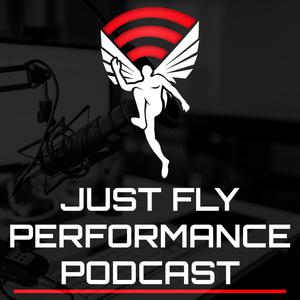 Just Fly Performance Podcast
Just Fly Performance Podcast
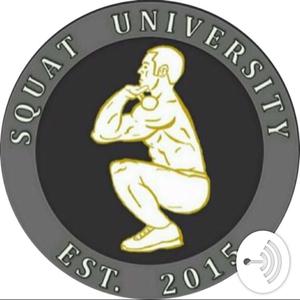 Squat University
Squat University
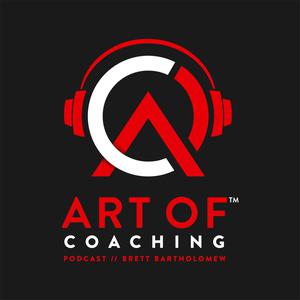 The Art Of Coaching
The Art Of Coaching
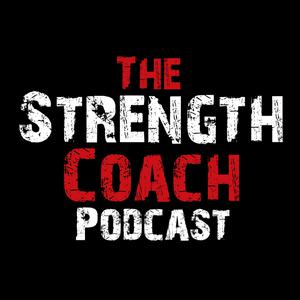 The Strength Coach Podcast
The Strength Coach Podcast
 Barbell Shrugged
Barbell Shrugged
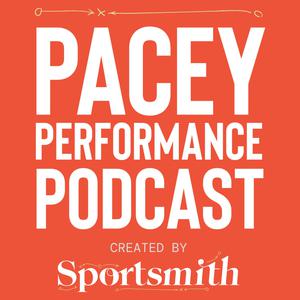 Pacey Performance Podcast
Pacey Performance Podcast